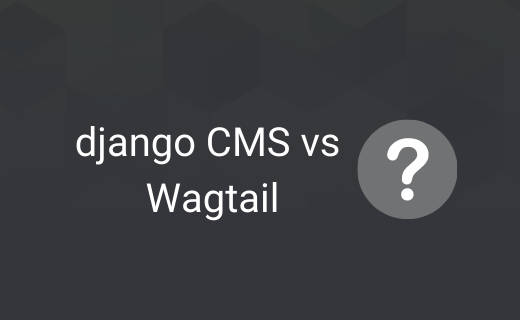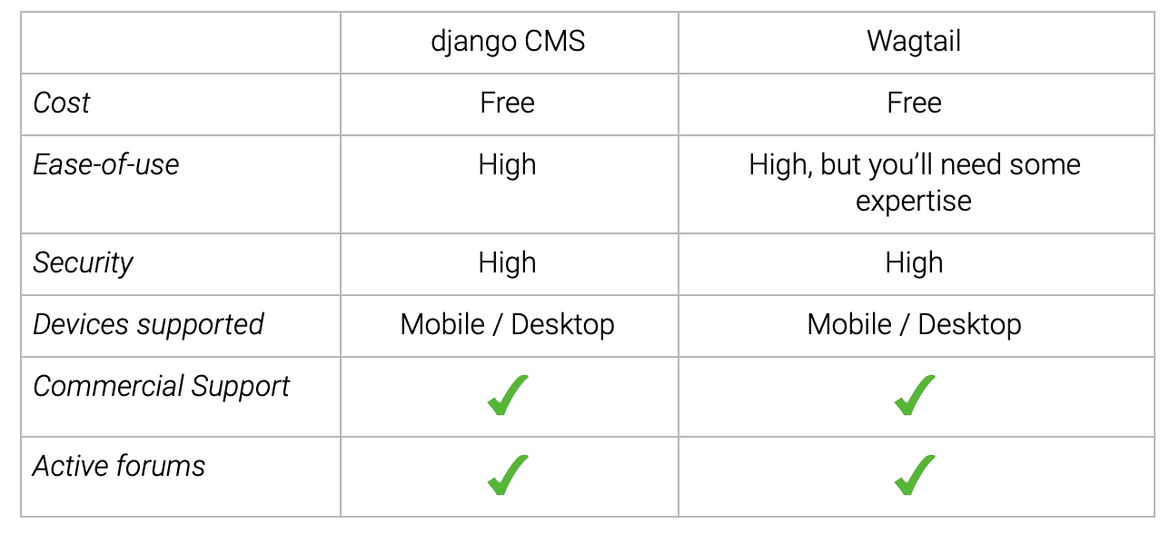django CMS vs Wagtail: which CMS is best for your website?
The two most popular Content Management Systems (CMS) in the Django world enter the ring.

Developers are flocking to these CMSs because they both use the same Python programming language and Django frameworks to design websites.
Python is the world’s fastest-growing programming language. Web designers who switch from traditional platforms such as WordPress love the simplicity a CMS using Python offers you.
But when two CMSs offer you many of the same benefits, it’s hard to know which platform between django cms vs Wagtail best serves your needs.
The answer comes down to your development experience and how much time you want to spend extending your website’s functionality.
django CMS vs Wagtail: the key points

Wagtail offers experienced developers control over the smallest details of their site
One thing becomes clear very quickly: Wagtail markets itself to developers and is more of a CMS framework than a CMS. That's why its popular with experienced developers at companies such as Google.
Like django CMS, Wagtail is future-proof because it uses Python. The programming language is considered the new standard for data science and so it’s well-suited to integrating future apps.
However, since it also puts a lot of focus on developers, website owners need to be aware that making changes to the website will usually always require you to consult a developer. This quickly brings back memories of Wordpress. And the comparison is not lame. Similarities between Wagtail and Wordpress in terms of positioning are striking.
With django CMS developers and content editors of all abilities can build a professional-looking site in minutes
django CMS, on the other hand, clearly markets itself as a lean enterprise content management system and is thus aimed at developers, as well as website owners, content editors and marketeers. Websites running on django CMS are often very content driven and large-scale with many editors.
django CMS’s community of users voted the platform’s ease-of-use as the number one benefit you’ll enjoy.
Once the project is set up, you can easily make edits to the frontend of your site with a single click by using the drag-and-drop function. In contrast to Wagtail, it is less often necessary to pick up the phone and call the developer. Many changes can be made by the content editor itself.
Even its most experienced developers love the simplicity with which you can integrate other plugins into the platform. Less time worrying about a complicated interface means more time improving your website.
django CMS is free and the platform offers you three installation options which cater to your experience.
What differences will you enjoy with Wagtail vs django CMS?
Wagtail provides some special features:
-
Easy to add Wagtail into an existing set of Django apps
-
Especially useful for chronological content like blogs or other data-centric sites, where you want to focus on the content and not so much on the visualisation of a larger set of big anding pages.
-
Wagtail offers full-text search across all your content
django CMS offers you exclusive benefits:
-
Well-documented and quite easy to implement (encapsulate) existing Django apps into the CMS itself. This is very useful if you’re building a content driven platform and enrich it with apps without boundaries.
-
It’s one of the most secure platforms on the market so your data is safe
-
django CMS’s drag & drop function and the ability to easily integrate other powerful tools makes it the most frontend-editing friendly platform on the market
-
A big plus are the multilingual capabilities that come right out of the box.
-
Editors love the interface of django CMS. It is dead easy and a joy to use.
django CMS and Wagtail are loved by developers of all abilities
django CMS offers you an easy setup and interface in multiple languages that allow even beginner users to design professional-looking sites in minutes.
The platform’s interface is especially suited for e-commerce and company websites, which is why it boasts enthusiastic users from around the world including NASA, National Geographic and L’oreal.
However, django CMS’s focus on simplicity means developers wanting the most precise command over their website’s look will need to quickly install plugins.
If you want such control, Wagtail may be a better choice for you. It takes significant knowledge to extend your website’s functionality with Wagtail, but if you’re a confident programmer then you’ll have no problems and enjoy greater flexibility in some areas of your site’s design.
Choose django CMS if you want a professional-looking website without the extra effort
Both django CMS and Wagtail use the same Python programming language and Django framework and so whichever you choose you’ll enjoy many of the same benefits.
The best choice for you comes down to your needs:
-
django CMS is perfect for enterprises who want to set up an amazing-looking, content-driven website
-
Wagtail offers additional options for experienced developers who feel confident extending their site’s capabilities
You can start building a professional-looking website in minutes with django CMS now
Start building now